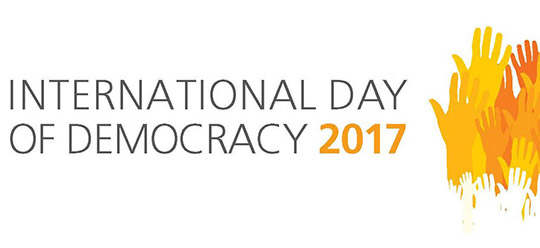Today is the UN’s International Day of Democracy (IDD). Time flies – it seems like much less than two years ago that I marked IDD in 2015 by meeting with civil society representatives to discuss the development of civil society in Vietnam. This year, the IDD again represents an opportunity to step back from our daily work and remind ourselves why transparent and accountable government, an active and enquiring press, the rule of law and human rights are so important to the development of open and prosperous societies.
Last week the UK Parliament held a small debate, called a Westminster Hall debate, to mark the IDD and reflect on why the UK sets such great store on promoting the basic principles of democracy at home and abroad. How states approach democracy can and will differ but what underpins democracy is a set of universal values. People should have a say in how they are governed and in turn governments must respect citizens’ basic human rights. The UN captures these principles in the Sustainable Development Goals (SDGs) and SDG 16 in particular. It calls on all states to promote peaceful and inclusive societies for sustainable development, to provide access to justice for all and to build effective, accountable and inclusive institutions.
The theme of this year’s IDD is democracy and conflict prevention. Vietnam has thankfully been free from violent conflict for many years and as a result has achieved astounding economic and social progress. But that doesn’t mean the lessons of the IDD don’t apply to Vietnam this year. Prime Minister Phuc has set out his vision as an action-oriented government of integrity for the people. A noble aim, but to get there in my view will require measures to strengthen government transparency, accountability and public participation in decision-making – all fundamental democratic values.
I was fortunate to have worked in Vietnam in the early 1990s at the beginning of my diplomatic career. When I returned as Ambassador 3 years ago, I was struck by how much Vietnam has changed. With the emergence of a more educated, better informed, and financially better-off middle class, aspirations have grown and more and more people want to be involved in discussions about public policy. Whether that is on environmental or land issues, food safety or corruption people want to share their views. In that respect social media has been transformative. An amazing 75% of Vietnamese people aged 18-34 are active Facebook users and this number continues to grow. Social media has created a space for people to discuss topics of genuine public interest and as platforms such as Facebook have become more popular they have developed into a vital reference point for the country’s policy makers. Just months ago, outcry on social media about Vinh Tan 1 Power’ plan to discharge dredged sediments into the water off Binh Thuan prompted the media, NGOs, and other associations to successfully call for the government to stop the plan.
This autumn the National Assembly will debate a new draft Law on Cyber Security for the first time. The Law is timely and will help Vietnam guard against a high and growing number of cyber attacks. But if Vietnam is to achieve its ambition of creating a government for the people, online debate should be encouraged.
The British Embassy will continue to work with the Vietnamese government and civil society to support Prime Minister Phuc’s vision. Just last week, for example, the UK funded a local NGO, the Centre for the Education, Promotion and Empowerment of Women (CEPEW), to train a small group of young people on the Law on Access to Information. The law is a huge step forward in the right direction to increase transparency and empower people to hold government accountable. Ho Chi Minh once said: “The goal of democracy is to enable people to speak out.” I can’t think of a stronger motto for this year’s International Day of Democracy.

